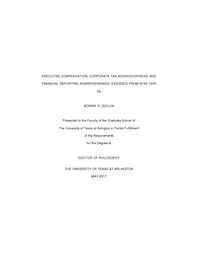
ATTENTION: The works hosted here are being migrated to a new repository that will consolidate resources, improve discoverability, and better show UTA's research impact on the global community. We will update authors as the migration progresses. Please see MavMatrix for more information.
Show simple item record
| dc.contributor.advisor | Skantz, Terrance | |
| dc.creator | Quillin, Bonnie R | |
| dc.date.accessioned | 2017-07-03T15:00:50Z | |
| dc.date.available | 2017-07-03T15:00:50Z | |
| dc.date.created | 2017-05 | |
| dc.date.issued | 2017-05-08 | |
| dc.date.submitted | May 2017 | |
| dc.identifier.uri | http://hdl.handle.net/10106/26797 | |
| dc.description.abstract | Using a variety of research methods, prior empirical research finds that executive compensation influences the behavior of managers, particularly with decisions involving risk. These studies show that, when executive compensation is more sensitive to stock price volatility, firms implement riskier investment and financial policies and take more aggressive positions in financial and tax reporting.
The sensitivity of executive compensation to stock price volatility is largely due to stock option compensation. Prior studies provide evidence that companies reduced the stock option grants to executives following the introduction of the Statement of Financial Accounting Standard 123R – Share-Based Payment (SFAS 123R). The reduced stock option grants lead to executive compensation being less sensitive to stock price volatility. Because SFAS 123R is unrelated to a manager’s inherent risk aversion, this paper uses the introduction of SFAS 123R as a natural experiment to further explore the relationship between executive compensation and managerial risk taking, in the form of aggressive positions taken in financial and tax reporting. This paper’s focus on changes in corporate tax aggressiveness and financial reporting aggressiveness complements the work of Hayes et al. (2012), Cohen et al. (2010), Chava and Purnanandam (2010), and Bakke et al. (2016), which examine changes in the riskiness of corporate financing and investment policies following SFAS 123R.
I fail to find evidence that firms affected by SFAS 123R have a more pronounced decline in corporate tax or financial reporting aggressiveness following SFAS 123R than firms not affected by SFAS 123R. These findings are consistent with Cohen et al. (2009) and Hayes et al. (2012) who examines changes in vega following SFAS 123R and the riskiness of firms’ investment and financing policies (research and development, capital investments, leverage, and acquisitions). Hayes et al. (2002) and Cohen et al. (2010) fail to find consistent evidence that managerial risk taking decreases following SFAS 123R.
These findings are inconsistent with Chava and Purnanandam (2010) and Bakke et al. (2016) who examine changes in vega following SFAS 123R and the association with corporate financial policies (the former considers book leverage and debt; the latter, corporate hedging in the oil and gas industry). Chava and Purnanandam (2010) and Bakke et al. (2016) find evidence that managerial risk taking decreases following SFAS 123R.
The lack of evidence of decreased aggressiveness in tax and financial reporting in my study add to the mixed results from other studies using SFAS 123R as a natural experiment to evaluate the relation between vega and aggressive corporate financing and risk policies. As concluded by Hayes et al. (2012), understanding the effects of vega on managerial risk taking continues to be a challenge for empirical research. | |
| dc.format.mimetype | application/pdf | |
| dc.language.iso | en_US | |
| dc.subject | Executive compensation | |
| dc.subject | Corporate tax aggressiveness | |
| dc.title | Executive Compensation, Corporate Tax Aggressiveness and Financial Reporting Aggressiveness: Evidence from SFAS 123R | |
| dc.type | Thesis | |
| dc.degree.department | Accounting | |
| dc.degree.name | Doctor of Philosophy in Accounting | |
| dc.date.updated | 2017-07-03T15:01:53Z | |
| thesis.degree.department | Accounting | |
| thesis.degree.grantor | The University of Texas at Arlington | |
| thesis.degree.level | Doctoral | |
| thesis.degree.name | Doctor of Philosophy in Accounting | |
| dc.type.material | text | |
| dc.creator.orcid | 0000-0001-8625-2986 | |
Files in this item
- Name:
- QUILLIN-DISSERTATION-2017.pdf
- Size:
- 1.327Mb
- Format:
- PDF
This item appears in the following Collection(s)
Show simple item record


